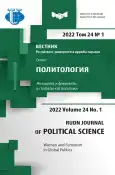Гендерное квотирование политического участия на примере Грузии
- Авторы: Амиантова И.С.1, Бицадзе Н.1
-
Учреждения:
- Российский университет дружбы народов
- Выпуск: Том 24, № 1 (2022): Женщины и феминизм в глобальной политике
- Страницы: 136-147
- Раздел: РЕГИОНАЛЬНОЕ СОТРУДНИЧЕСТВО И ИНТЕГРАЦИЯ
- URL: https://journal-vniispk.ru/2313-1438/article/view/322595
- DOI: https://doi.org/10.22363/2313-1438-2022-24-1-136-147
- ID: 322595
Цитировать
Полный текст
Аннотация
В фокусе внимания - исследование ключевых факторов, ограничивающих политическое представительство женщин в современном мире. Залогом защиты от дискриминации служит успешное проведение гендерного квотирования политического участия. Изучение законодательной базы современной Грузии показало, что, несмотря на наличие общей правовой основы для равноправия женщин и мужчин, реальность в политической жизни иная. Отсутствие эффективных механизмов квотирования заметно ослабляет реализацию гражданских и политических прав женщин. Стереотипные взгляды и представления о роли женщин в обществе служат основными барьерами рекрутирования в политико-административном направлении. Рассмотрение гендерного аспекта политического представительства как комплексной проблемы обусловило необходимость применения системного подхода. При исследовании эволюции гендерного равенства использовался исторический и сравнительный метод. Отдельную группу используемых в статье методов составил политико-правовой анализ эмпирических данных национальной статистики. В статье показано, как законодательная власть Грузии, вводя обязательные квоты для национальных и местных правительственных структур, влияет на положение женщин в политике, увеличивая вероятность того, что они будут баллотироваться, избираться и назначаться.
Ключевые слова
Об авторах
Ирина Сергеевна Амиантова
Российский университет дружбы народов
Автор, ответственный за переписку.
Email: amiantova_is@rudn.ru
ORCID iD: 0000-0003-1543-0815
кандидат политических наук, доцент кафедры политического анализа и управления
Москва, Российская ФедерацияНиколоз Бицадзе
Российский университет дружбы народов
Email: 1042208033@pfur.ru
ORCID iD: 0000-0001-6567-7184
аспирант кафедры политического анализа и управления
Москва, Российская ФедерацияСписок литературы
- Ara, F. (2019). Barriers to the political participation of women: A global perspective. Society & Change, 13(4), 7-22.
- Ballington, J. (2014). The Implementation of Quotas: African Experiences Quota Report Series. In J. Ballington (Ed.), International Idea.
- Barnes, T., & Beaulieu, E. (2019). Women politicians, institutions, and perceptions of corruption. Comparative Political Studies, 52(1), 134-167.
- Baturo, A., & Gray, J. (2018). When do family ties matter? The duration of female suffrage and women’s path to high political office. Political Research Quarterly, 71(3), 695-709.
- Belschner, J., & de Paredes, M. (2021). Hierarchies of representation: The re-distributive effects of gender and youth quotas, Representation Journal of Representative Democracy, 57(1), 1-20. http://doi.org/10.1080/00344893.2020.1778510
- Hernes, H. (2018). Women and the welfare state: the transition from private to public dependence. In A.S. Sassoon (Ed.), Women and the State (pp. 77-92). London, Routledge.
- Hessami, Z., & Lopes da Fonseca, M. (2020). Female Political Representation and Substantive Effects on Policies: A Literature Review. IZA - Institute of Labor Economics (IZA DP No. 13125), 4-13.
- Mlambo, C., & Kapingura, F. (2019). Factors influencing women political participation: The case of the SADC region. Cogent Social Sciences, 5(1), 28-41. https://doi.org/10.1080/23311886.2019.1681048
- Profeta, P. (2020). Gender Equality and Public Policy: Measuring Progress in Europe. Cambridge University Press. https://doi.org/10.1017/9781108525886
- Reyes, G. (2001). Four main theories of development: modernization, dependency, word-system, and globalization. Nómadas. Revista Crítica de Ciencias Sociales y Jurídicas, 4(2), 109-124.
- Serpe, L. (2018). Focus Group Findings on Perceptions of Women in Georgian Politics - An Assessment of Perceptions of Women as Political Candidates and Elected Officials. International Foundation for Electoral Systems. Statistics Sweden.
- Shames, S., & Wise, T. (2017). Gender, diversity, and methods in political science: A theory of selection and survival biases. PS: Political Science & Politics, 50(3), 811-823.
Дополнительные файлы









